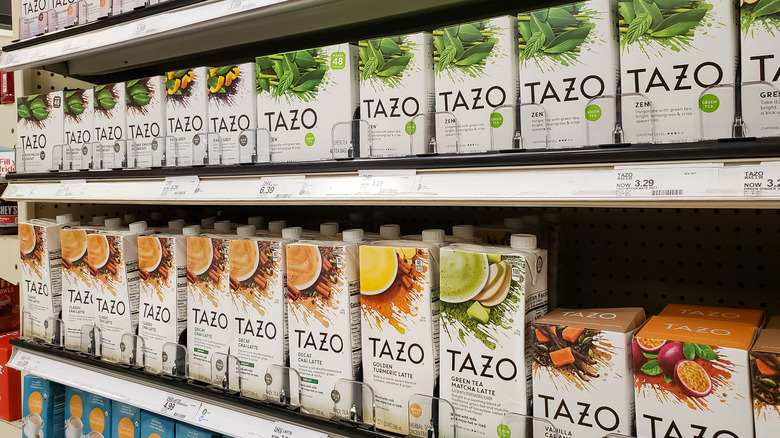The Major Sustainability Shift Tazo Tea Just Announced
Now, when you steep that cup of tea in the morning (or the afternoon, or the evening), you can do the planet a major favor at the same time. Tazo is "turning over a new tea leaf" with this new major sustainability shift. As the tea brand puts it, "We're experts at brewing tea. Now we're learning to be champions for the planet and its people."
As part of a newly announced sustainability initiative, Tazo plans to make its tea supply entirely regenerative by 2029 (via FoodDive), a movement it calls "Regenerative Organic." To get started, Tazo aims to reach 60% to 80% supply regeneration by the close of 2023, and total carbon neutrality by 2026. Tazo is also part of a Unilever tea brands coalition called Ekaterra, which has made public its goal of becoming carbon neutral by 2030, per the news outlet. Tazo also says all of its product packaging will be earth friendly by 2025, whether it's recyclable, compostable, or reusable.
As part of this massive sustainability move, Tazo also announced that it would be reintroducing four teas: Awake English Breakfast, Zen, Chai, and Darjeeling. According to the press release, these tea varieties already boast the USDA Organic label and are made with ingredients certified by the Rainforest Alliance -– a global nonprofit committed to fostering environmentally-friendly agricultural business practices via organization audits with meticulous standards. So, how does Tazo plan to make these goals a reality?
The future of sustainable agriculture practices
Jami Lewchik, head of sustainability at Tazo, says the company will focus on planting cover crops, promoting biodiversity and soil health, improving pollinator habitats, creating better working conditions for farmers, and protecting natural ecosystems including forests and waterways, per FoodDive. Tazo has also partnered with Pure Strategies to conduct a thorough environmental and social audit of company operations as it moves forward.
Tazo might be taking a cue from other beverage brands. In 2018, Anheuser-Busch (the international beer giant behind Budweiser and others) announced radical sustainability goals for 2025 to reshape its entire operational practices. Anheuser-Busch's focus was centered around water conservation, lowering carbon emissions, circular packaging, and renewable electricity — the company now brews using 100% renewable energy. In fact, sustainability has emerged as something of a fashionable trend in recent initiatives for many companies. Even the automobile industry is moving toward sustainability in light of recent motions like the European Green Deal and the European Commission's proposal for car companies to get rid of emissions altogether by 2035 (per Forbes).
According to FoodDive, Tazo alone requires an estimated 17,000 acres of farmland to provide all the materials for its products. But, changes like this one can make a huge impact, especially when other companies follow the lead. "We are all buying the same botanical ingredients at the end of the day, farmed in the same areas around the world," says Lewchik. "Imagine the impact that can have on the Earth."

